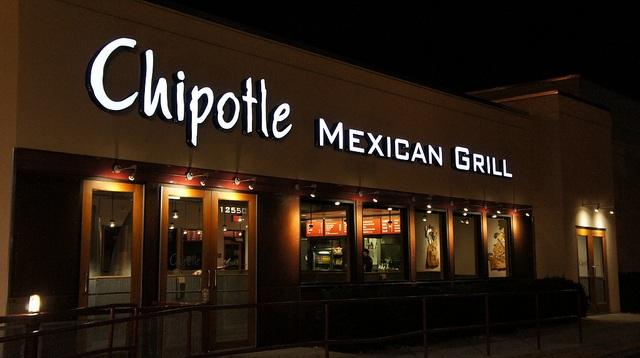
Once the darling of both Wall Street and sustainability advocates, that rare admiration from both constituencies for Chipotle has gone down in flames over the past year. Outbreaks of E. coli and norovirus at scattered locations across the country have scared off customers, and the jury is out on whether free food coupons are going to lure them back.
Last August, after some food-safety scares, Chipotle's stock roared back to hit an all-time high of almost $750 a share. But additional foodborne illness episodes have sunk the stock’s price again, down to almost $400 a share before rebounding to its current price hovering around $475.
Now, some investors are saying that they have had enough. The financial advisory firm Clean Yield Asset Management, which focuses on securities issued by what it deems are socially responsible companies, has partnered with Arjuna Capital, another investment advisor, to pressure Chipotle to change its corporate governance practices. In a 10-page filing submitted to the Securities and Exchange Commission (SEC), Clean Yield is urging Chipotle’s shareholders to vote in favor of a resolution that will tie executive compensation to the company’s sustainability performance.
Pointing out the fact that the $4.5 billion company has yet to issue even one sustainability report, the letter asserts such disclosure would only be the start of the company taking real steps to mitigate future risks.
In comparing Chipotle to some if its competitors, including Panera Bread, McDonald’s and Dunkin’ Donuts, all of which have committed to sustainability reporting, the resolution asserts that “a commitment to delivering a sustainable product should not be confused with possessing the means of delivering it.” Linking sustainability metrics to sustainability performance, asserts Clean Yield’s managers, could incentivize all employees, not just executives, to take sustainability more seriously, while reducing ongoing risks that have had taken a large bite out of the company’s financials.
Even before foodborne illnesses at its restaurants rocked the company, Chipotle had received criticism for its executive pay packages. A few years ago, a survey included the company’s co-CEOs within its list of the top 100 overpaid CEOs. Furthermore, the same report asserted that, within the restaurant industry, Chipotle’s Steven Ells and Monty Moran were the most overpaid CEOs due to their combined 2013 compensation of $49.5 million.
A year later, shareholders responded to that assertion by rejecting a proposed pay package in an overwhelming 77 percent “no” vote. While Chipotle kept preaching about its “food with integrity,” many shareholders and investment holders felt the way in which executives were paid lacked any integrity at all — and, in turn, they were not swayed by lofty rhetoric, cool paper cup designs or deep thoughts on to-go bags.
So far, Chipotle’s board of directors is refusing to acquiesce to any such demands over sustainability reporting. One proposal on the company’s most recent proxy statement, issued in anticipation of its annual meeting this May in Denver, is asking shareholders to approve a mandate for an annual sustainability report, which would be issued for this first time in October. Insisting that the company has made a “deliberate decision not to report in this fashion, preferring to devote our resources instead to taking actions,” Chipotle’s board is urging shareholders vote against it.
And as for Clean Yield’s proposal to integrate sustainability performance with executive pay, which is also up for a vote on the same proxy statement, the board is also recommending that shareholders check the “no” box. Saying that revamping its executive pay structure would hamper the “responsible, long-term growth of our business,” the company maintains that its current business practices are a strong enough incentive.
Are Chipotle’s executives and board tone-deaf? Perhaps. Is this a foolish stance to take considering the cutthroat nature of the restaurant industry? When it comes to its long-term success, the company’s stubbornness definitely risks alienating its stakeholders and shareholders even more, and the I-told-you-so’s will mount, especially if another outbreak occurs in the near future.
Image credit: Aranami (Flickr)

Leon Kaye has written for 3p since 2010 and become executive editor in 2018. His previous work includes writing for the Guardian as well as other online and print publications. In addition, he's worked in sales executive roles within technology and financial research companies, as well as for a public relations firm, for which he consulted with one of the globe’s leading sustainability initiatives. Currently living in Central California, he’s traveled to 70-plus countries and has lived and worked in South Korea, the United Arab Emirates and Uruguay.
Leon’s an alum of Fresno State, the University of Maryland, Baltimore County and the University of Southern California's Marshall Business School. He enjoys traveling abroad as well as exploring California’s Central Coast and the Sierra Nevadas.














